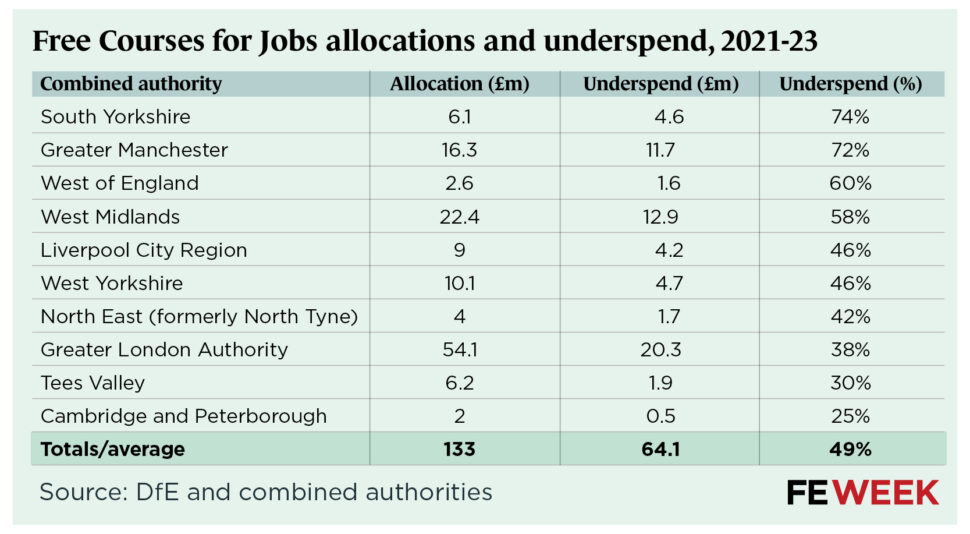Low uptake of a flagship government retraining scheme that offers free courses to adults resulted in mayors handing back £64 million in the first three years – half of what they were allocated.
Free Courses for Jobs (FCFJ), announced in 2020, offers fully subsidised level 3 courses in hundreds of subjects to adults with low qualifications or wages.
At the time, the then prime minister Boris Johnson made headlines with the promise his “lifetime skills guarantee” – backed by a wider £2.5 billion national skills fund – would “boost career prospects, wages and help fill skills gaps”.
But analysis by FE Week, based on information shared through freedom of information requests, has revealed that half of the cash handed to mayors between 2021 and 2023 – £133 million – was quietly returned.
England’s 10 mayors with devolved skills powers are responsible for about two-thirds of the £98 million in funding handed out each year for FCFJ, but records of exactly how much they or the government spend have never been routinely published.
Experts have blamed low spend on FCFJ on the narrow eligibility offer, the cost-of-living crisis, and the way the programme was procured at short notice during the pandemic.
Who is eligible?
Before FCFJ was rolled out, only 19 to 23 year olds were fully funded for their first level 3 qualification, while anyone older had to take out an advanced learner loan to pay for the course.
At launch the courses were only free for adults without a level 3 qualification. This was expanded in 2022 to include any adult who was unemployed or earning less than a typical salary provided by the national living wage, regardless of whether they already held a level 3.
In August last year the government limited the offer to adults earning below £25,000.
Mayors told FE Week the DfE gradually relaxed rules on what courses they could fund through FCFJ, and which learners could be eligible.
‘Flaws from the outset’
Sue Pember, director of policy at adult learning body Holex, argued the FCFJ scheme was not always tailored to the needs of its target audience, who face an increasing cost of living and may “carry baggage of past educational struggles”.
She said: “Although the intent was commendable, it faced flaws from the outset.”
While official statistics show enrolments on level 3 courses on the FCFJ list increased from 32,000 per year in 2018-19 to 80,000 in 2023-24, only about 50,000 achieved their qualification.
Pember said low participation and retention was “flagged early on” to the DfE.
But officials failed to put in place a “preparatory ladder” of courses in basic English, maths and study skills that would bridge the gap for learners to move on to a more demanding level 3 course, she added.
Skills policy consultant Gareth Thomas said some training providers may be “risk averse” about FCFJ courses in a bid to hit achievement targets.
There may also be “market saturation” with learners also being offered shorter employment-focused training schemes such as sector-based work academies and skills bootcamps.
Mayoral spending
Mayoral authorities told FE Week they handed back £64 million of their £133 million allocation between 2020 and 2023.
Underspends mayors hold at the end of the year are subtracted from the next year’s payment, unlike leftover funds from the main adult education budget which mayors can keep as reserves.
Most mayoral skills teams said the rushed introduction of the fund towards the end of the 2020-21 academic year meant there was little time to plan for it.
In the three years up to 2023, South Yorkshire Mayoral Combined Authority handed back the highest underspend – 74 per cent of its £6.1 million pot.
A spokesperson for the authority, which gained devolved skills powers in 2021-22, said it “mobilised” FCFJ provision in the second year (2022-23) and introduced local flexibilities around who could access courses for free, which resulted in a “significant improvement” to a 90 per cent spend in 2023-24.

Less given back
Liverpool City Region Combined Authority, which spent just over half of its £9 million FCFJ pot in the three years, said “slower initial delivery” was common with new programmes. It achieved full expenditure and delivery in 2023-24.
The Greater London Authority said it most recently used 87 per cent of its budget after spending only 16 per cent in the first year.
Julian Gravatt, deputy chief executive of the Association of Colleges, said: “It’s disappointing that, at a time when money for adult education is scarce, specific funding for the free course for jobs scheme hasn’t reached front-line delivery.”
He told FE Week that removing fees “does not, in itself, increase participation in courses, particularly if the core funding for those courses keeps reducing and therefore makes it hard for colleges to retain and recruit teaching staff”.
The English devolution white paper published in December revealed mayoral strategic authorities would no longer have to ring-fence FCFJ funding, meaning they can spend allocations on other adult education initiatives that better fit local needs.
















Your thoughts